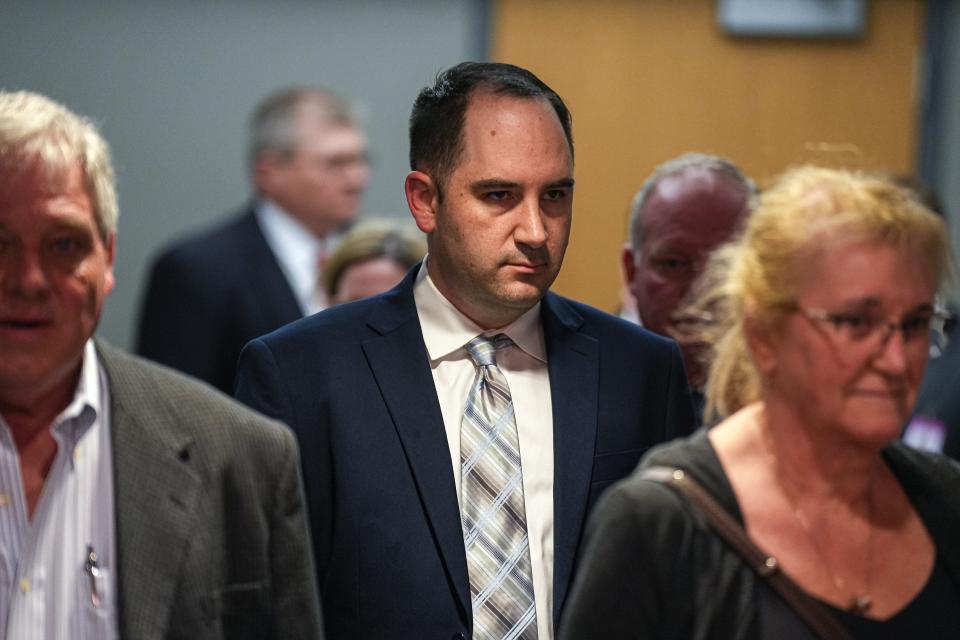Texas Gov. Greg Abbott pardoned Daniel Perry and shifted the rule of law | Editorial
- Oops!Something went wrong.Please try again later.
When Gov. Greg Abbott pardoned Daniel Perry last Thursday, the decision was predictable. It was no surprise that Abbott wished to pardon Perry, convicted for murdering a Black Lives Matter protester during a 2020 rally in downtown Austin. Abbott had announced his intent on social media less than 24 hours after Perry was convicted in 2023. But for a governor who uses his bully pulpit to target “woke” politics and “rogue” district attorneys for cherry-picking laws to prosecute, Abbott’s interventions in this case have been chilling. In pardoning Perry, Abbott further shifted the rule of law in Texas to a frightening point where the test of whether one goes to prison is not whether a jury rules you did the crime, but whether the governor agrees with your politics.
It’s fair to note that this case was complex. Two men, both legally carrying firearms, confronted each other with fatal results in a state with a strong “Stand Your Ground” law. What is clear is that an elected DA, José Garza, prosecuted the case after a grand jury heard arguments and found enough evidence to bring Perry to trial. Next, a trial jury heard the evidence and delivered a verdict – jurors sentenced Perry to 25 years in prison. Whatever your opinions of the case — and there are many in Texas who support Abbott's decision — we should all respect the painstaking work that the trial jury did in sitting through eight days of testimony, hearing from nearly 40 witnesses, reviewing the full picture of the evidence and reaching a verdict and applying the law.
And if the defense had a problem with the jury's verdict our legal system provides for an appeals process. Abbott didn't even allow for this possibility, announcing his wish for a pardon less than 24 hours after Perry was convicted.
Letters to the Editor: Add Abbott's pardon of Perry to his long and indefensible list
The jury took far longer to weigh the facts. On July 25, 2020, Perry, a former Army sergeant, killed Garrett Foster, a 28-year-old Air Force veteran marching in an Austin protest against police violence. Foster was legally carrying an AK-47-style rifle. His goal, he had said, was to protect marchers. Perry, driving an Uber, ran a red light and drove into the crowd. He, too, was legally carrying a firearm. When Foster approached, Perry shot and killed him.

Perry later claimed self-defense. But no witness ever stated that Foster aimed his weapon. Records later released by the courts showed that Perry had texted numerous racist fantasies about killing minorities and Black Lives Matter protesters. “I might go to Dallas to shoot looters,” Perry wrote in one text.
After the conviction, conservative commentators, including former Fox host Tucker Carlson, mocked Abbott as being soft on crime. The next day, Abbott pledged to pardon Perry if advised to do so by the Texas Board of Pardons and Paroles. He directed members to expedite a study of the case.
Typically, legal experts say, cases are reviewed for pardon only after the appeals process ends. “This was an unusual situation from the start,” said David Kwok, director of the University of Houston’s Criminal Justice Institute. “Even before this defendant was sentenced, the governor made public his interest in pardoning him… the case was tried, but it technically was not completed at the point when he first spoke about it.”
The pardons and paroles board, whose members are all appointed by Abbott, stated that their unanimous recommendation came after “a thorough examination of the amassed information.” This too, is highly unorthodox, attorney Gary Cohen told the Washington Post. “The parole board in Texas is not supposed to be a judicial body. They don’t engage in relitigating the facts of the case. That’s not the board’s job and never has been.”
It is also normally the offender – not the governor – who initiates a pardon request. Typically, Cohen said, offenders try to show some level of personal remorse and change. But in this case, Perry's attorney and Abbott made little mention of the loss of Garrett Foster's life.
Instead, they complained about the toll taken on Perry, his career, and Stand Your Ground laws. “Daniel Perry was imprisoned for 372 days and lost the military career that he loved,” his lawyer stated. “We intend to fight to get Daniel's military service characterization upgraded to an Honorable Discharge.”
More: Mixed reactions on X to Gov. Abbott's pardon of Daniel Perry: 'Excellent,' 'all-time low'
Abbott directed blame at Garza and the jury and invoked politics. In his pardon, issued immediately after the board's recommendation, Abbott said, “Texas has one of the strongest ‘Stand Your Ground’ laws of self-defense that cannot be nullified by a jury or a progressive District Attorney.”
It was one of the most peculiar features of a pardon riddled with unorthodoxies. José Garza, whom Abbott has targeted for removal from office, of course neither served on the jury or delivered the verdict or sentence. His office presented its case. The jurors performed their duty. Their only transgression seems to have been exercising their conscience after hearing the totality of evidence in the case.
This article originally appeared on Austin American-Statesman: Gov. Abbott pardoned Daniel Perry and shifted the rule of law in Texas

